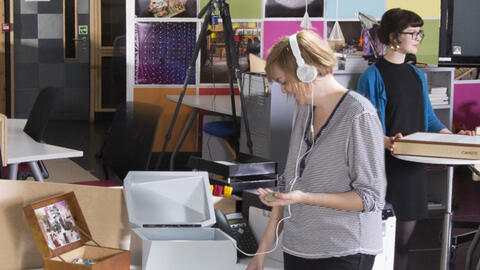
Clare Reddington CEO
on Tue 28 Jan 2020Invention versus innovation - embracing uncertainty
Posted on Tue 28 Jan 2020
How do we embrace uncertainty and value the slippy to navigate the conceptual emergency we live in? By Clare Reddington, Watershed CEO
A talk I gave at Remix in January 2020 - minus the references to excruciating period pain I started with ;)
There seems to be an embarrassment of certainty around at the moment. We can all see it – in politics, in the media, online – certainty provides the armour for polarised debates, thuds through talk radio and reverberates in LAST WORD MAN and that final unequivocal reply on twitter… and yet certainty isn’t what we feel – from austerity to the climate crisis - I have never felt less sure I have the right questions, let alone the right answers.
The world has outstripped our capacity to understand it, says the International Futures Forum, we are living in conceptual emergency.
As we look for new ways to build meaning, share experience and solve problems, somehow, in both the culture and the technology sectors, we have developed an emphasis on certainty – manifest through counting and KPIs, rather than supporting unknowing or unknowable possibilities.
The brilliant essayist and author Rebecca Solnit refers to this as the tyranny of the quantifiable - of the way that what can be measured almost always takes precedence over what cannot.
She sees this as a failure of language to describe complex, subtle, and fluid phenomena, as well as the failure of those who make decisions to understand and value these slipperier things.
As part of conversations around a data fellowship call we recently ran, I spoke to a person leading an amazing creative youth organisation who collects over 2000 different data points for 16 different funders. We count bums and eyeballs, distance travelled and jobs created. We are increasingly trapped in funding and organisational models that prioritise the certainty of the quantifiable, and am not sure its going to cut it in an ongoing conceptual emergency.
That doesn’t mean we don’t do unusual, brave, audacious things – it just means we are often making them harder to spot, to cherish and to nurture BECAUSE of our metrics. We pin bright ideas down before they can fly. In an attempt to understand and plan for the uncertain times we live in, we CLAIM certainty where it doesn’t belong, and I believe this is partly because we are confusing innovation and invention:
Invention is magic. It is the spark of an idea, it is a new way of doing something, it is the unknown.
Invention thrives in non commoditised conditions of trust, inclusivity, joyfulness and care.
It is revealed over time and is hard to predict.
Innovation is how we grow that idea, the systems needed to make it scale-able, replicable, stable. Its systems are easier codified and its impact is easier modelled.
When we use the measures of innovation to pin down invention, we get caught in the certainty trap and stifle the new ideas and new talent we desperately need. I am not anti reporting, or being repsonsible with public funding or even counting impact - but if we define our outputs before we begin and then constantly reference them in meetings, perhaps we will only achieve exactly what we have predicted.
How then can we programme in both – embrace the uncertainty and magic of invention and the potential for impact of innovation?
If we concentrate on spaces, tools, dreams and behaviors alongside money and measures, perhaps we will get what we actually need.
12 years ago we set up Pervasive Media Studio – a space and a place to model just this – though its only in hindsight that we have come to understand that that is what we are doing. The studio is part of Watershed, and is a co-working space for artists, academics, technologists, engineers and more. We have 45 desks and a community of over 350 - our work, which mostly explores human experience and creative technology - is shared in Bristol, across the uk and internationally.
We have hardly any rules – just principles or intentions – to guide or stimulate a community of invention. I will share five of them:
The first is curation – when we set up the studio we wanted something purposefully curated, to ensure the mix of the community worked. Most co-working spaces focus on either cultural OR commercial propositions, we wanted both. We also wanted to be open to creative practitioners from all art forms, and to both institutions and independent practitioners. A healthy ecology doesn’t happen on its own - it needs curation.
Last week, studio resident Laura Kriefman of Hellion Trace wrote a blog about her ten years in the studio summing up the power of offering a space that crosses disciplines:
"At the Pervasive Media Studio, no one is working on the same thing. Every conversation you have is from a point of being un-knowing. In any one given day in the studio, you’ll have a conversation with somebody developing new publishing techniques, new forms of documentary filmmaking, tools for people with dementia, bone-conductive gobstoppers, city change-making, to our work exploring movement and technology."
Crossing sectors and smashing silos isn’t enough though if the people telling stories all look the same – so diversity and inclusion remain at the heart of methodology. As John Seely Brown would have it - in times of rapid change, to deliver new ways of working, thinking and being, to deliver new types of content, product or experience, we need to work with people who are not like us; am pretty sure he meant in terms of discipline and sector but we apply Creation Nets in terms of cultural background, ability, class and outlook.
I should be clear that my frustration with counting is simply with regards to how we pitch nurture and squash inventive ideas – it is about the need to predict certains kinds of outputs – it is not about understanding the diversity of your cluster or benchmarking inclusion at audience, practitioner or staff level – which I think is vital.
The third principle is an emphasis on interruptability - at any time, we encourage members of the Studio community, Watershed staff and visitors to interrupt one another and find out what the other is doing, ask questions, seek advice, share opportunities etc. By being open, curious and interruptible, we are all able to make better connections, share our expertise, and create the conditions for all of our ideas to be improved.
The Studio thrives on the generosity of its community. We interpret this broadly - it can encompass generosity of ideas, resources, running events, skill swaps or meet ups, sharing client leads and funding opportunities, collectively testing prototypes or just offering to make a cup of tea.
As Rebecca Solnt says, it is difficult, sometimes even impossible, to value what cannot be named or described. Both generosity and interuptability are written in to our contracts – no money changes hands between ourselves and the studio residents but we circulate value through gifts, care and stories – tho they are not codified or counted per se.
Finally, we believe invention is a process - it is messy and unpredictable, it loops around, can take ages or no time at all, its only certainty is the process is as good as your ability to ask a question.
Back to Laura -
“What’s extraordinary about that space is that permission for all of us to be un- knowing. We enter that space because we have a question. We’ve often been an expert in another field, but we’ve come in with a question, not an answer. We come into a space where we’re given permission to be vulnerable and unknowing on a daily level, at a conversation by the coffee machine level, a collaborative level.”
So how does this delicious utopia scale, mature, become part of an innovation process? For Watershed the fact that Pervasive Media Studio was established outside of its regular business – that of cultural venue and independent cinema – enabled us to try out new ways of working - we were not weighed down by ‘the way things are done’.
Like Lockheed Martin’s Skunk Works (an internal innovation unit with its own rules and practices) we were able to break the rules and challenge systems around HR, meetings, communication, staff structure etc. However, an internal innovation unit is only as good as its ability to codify learning and meaningfully share it back. Six years ago we moved the studio into Watershed and began unifying the teams – creating a renewed ability to embed learning and practice back into Watershed. Last year we started the process again, beginning to implement Frederick Laloux’s Reinventing Organisations into the team structures of the studio – from which we test, iterate and infect the learning back into the whole.
Why is invention important? When we started Pervasive Media Studio we did so alongside Hide&Seek, Coney, Duncan Speakman, Blast Theory, Punchdrunk… I could go on. The work explored expanded performance, digital placemaking, augmented audio, hyperlocal content, located media – the stuff that large corporates, brands and tech cos are hot for right now. Would an understanding of invention, trust and uncertainty short cut that development cycle? – I think it might. But it would also do something else.
I will end with an extract from This Is Not A Drill – an Extinction Rebellion handbook:
“We need to rewild the world. That much is obvious. But first we need to rewild the imagination. We must all learn how to dream again, and we have to learn together, to break down the old ways of thinking and to move beyond our current conception of what is and what is not possible."
To rewild our imaginations we are going to have to embrace some uncertainty alongside all that acceleration. To stop rewarding quantity over quality – to sit invention and innovation side by side and learn to nurture them both.

